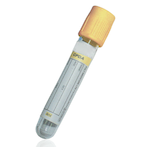Beta Human Choronic Gonadotrophin (B-HCG)
Specimen Volume
1 mL blood (250ul serum)Sample Preparation
Centrifuge.
Turnaround Time
1 daySample Processing In Laboratory
Usual
Sample Stability
Store at 2-8ºC for up to two days. For longer periods store at -20 ºC.
General Information
Human Chorionic Gonadotrophin (HCG) is produced in the placenta during pregnancy but it can also be produced by tumours of the trophoblast and germ cell tumours. The alpha sub-unit of HCG is virtually identical to that of LH, FSH and TSH, whereas the β sub-unit is the chain which gives the hormone its specific hormonal function. The biological action of HCG is to maintain the corpus luteum during pregnancy and influence steroid hormone production.
Depressed values indicate threatening or missed abortion, ectopic pregnancy, gestosis or intra-uterine death. Elevated levels not due to pregnancy are found with other diseases such as tumours of the germ cells, ovaries, bladder, pancreas, stomach, lungs and liver, chorionic carcinoma or hydatidiform mole. HCG is used in conjunction with AFP in the diagnosis and monitoring of gonadal and extragonadal germ cell tumours.
Serum β HCG may also be used in the investigation of ectopic pregnancy. This is a pregnancy outside of the uterine cavity that may be associated with a negative urinary pregnancy test. Serial HCG measurements in ectopic pregnancy may not rise at the same rate as that seen in normal pregnancy and therefore serial measurements of HCG can be used in the differential diagnosis of abdominal pain in women of child bearing age.
Please note that pregnancy specific reference ranges are not available
Patient Preparation
Samples from patients receiving high biotin doses (i.e. >5 mg/day) should be taken at least 8 hours post dose. Please inform the laboratory if the patient has been treated with monoclonal mouse antibodies or may have received them for diagnostic purposes.
Notes
Samples should be clot-free and free from other particulate matter. The presence of fibrin may cause erroneous results.
Reference Range
Pregnancy ranges:
Negative <5 IU/L
Equivocal ≥5 - <25 IU/L
Positive ≥25 IU/L
Source of Reference Range
Abbott DiagnosticsSpecifications
-
EQA Status:
NEQAS
- EQAS Scheme: Yes








